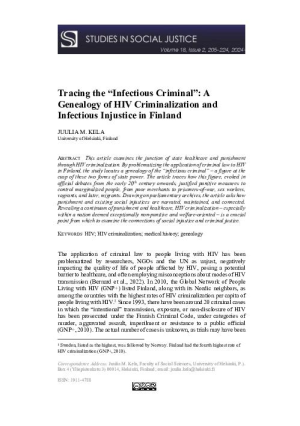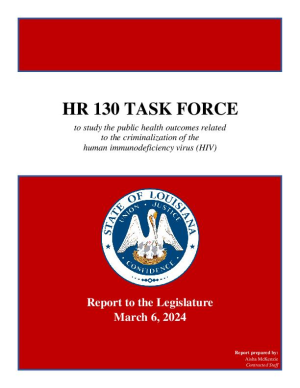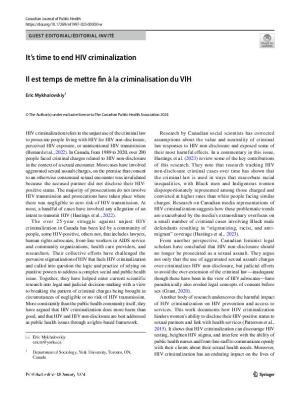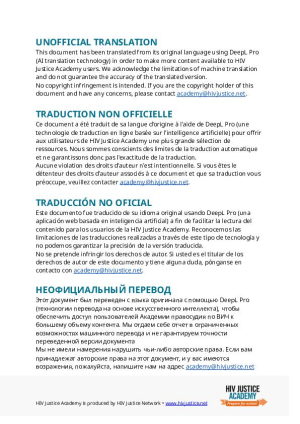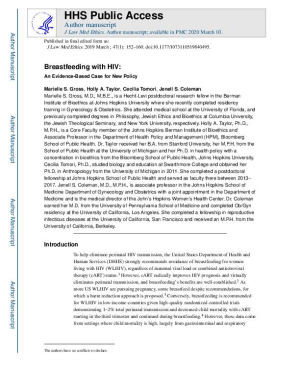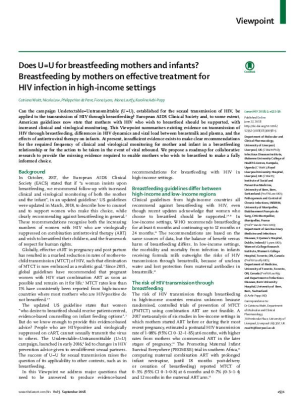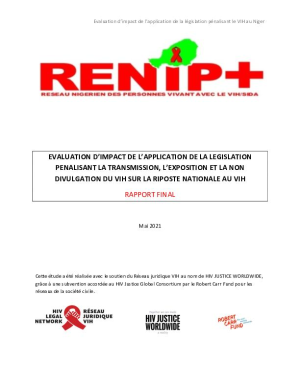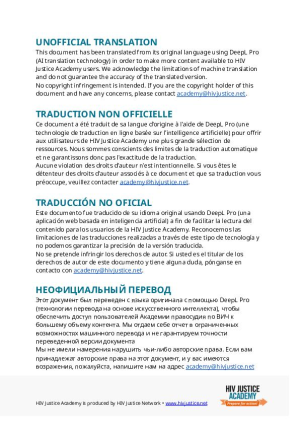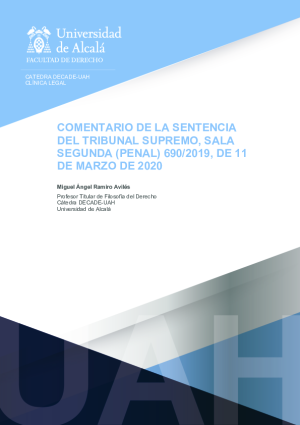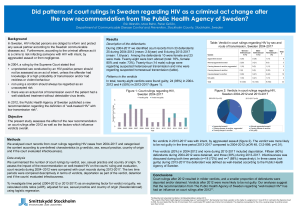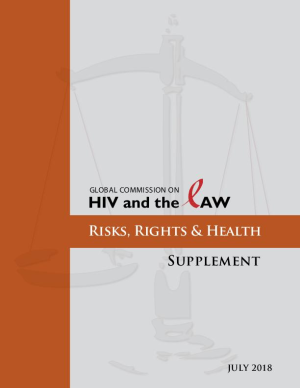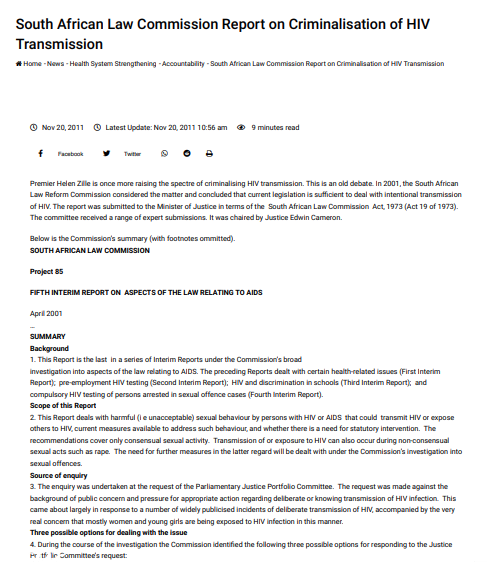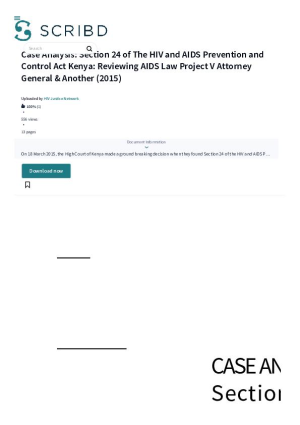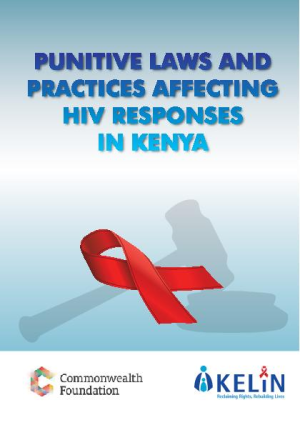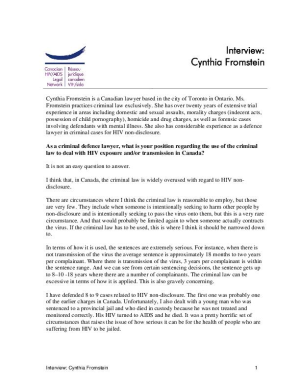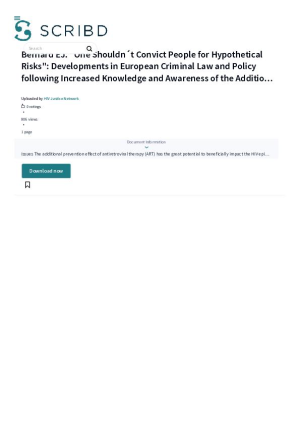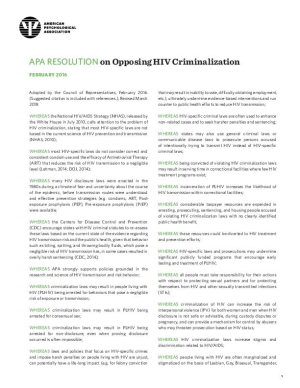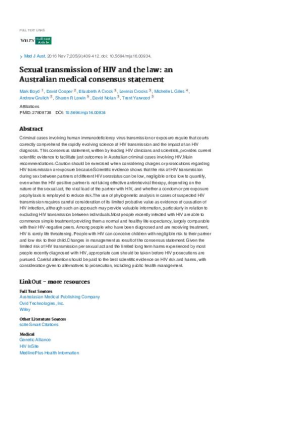Tracing the “Infectious Criminal”: A Genealogy of HIV Criminalization and Infectious Injustice in Finland
This article examines the junction of state healthcare and punishment through HIV criminalization. By problematizing the application of criminal law to HIV in Finland, the study locates a genealogy of the “infectious criminal” – a figure at the cusp of these two forms of state power. The article traces how this figure, evoked in official debates from the early 20th century onwards, justified punitive measures to control marginalized people, from poor merchants to prisoners-of-war, sex workers, vagrants, and later, migrants. Drawing on parliamentary archives, the article asks how punishment and existing social injustices are narrated, maintained, and connected. Revealing a continuum of punishment and healthcare, HIV criminalization – especially within a nation deemed exceptionally non-punitive and welfare-oriented – is a crucial point from which to examine the connections of social injustice and criminal justice.
2023-2024 Report of HIV Criminalization (HR 130) Task Force
The Louisiana legislature created the HIV Criminalization Task Force (Task Force) during the Regular Session of 2023 through the unanimous passage of House Resolution 130, which was enrolled in June 2023. Pursuant to HR 130, the purpose of the Task Force was to study the public health outcomes related to the criminalization of the human immunodeficiency virus (HIV) and provide recommendations to modernize R.S. 14.43.5 to reflect both the realities regarding the routes and risks of transmission of HIV and to better serve the public interest in the Ending the HIV Epidemic initiative in Louisiana in a final report of its findings prior to the convening of the 2024 Regular Session of the Legislature of Louisiana. The report makes legislative recommendations for consideration by the Louisiana State legislature .
Enforcement of HIV Criminalization in Ohio
This study examines the history of HIV criminalization in Ohio and analyzes key trends in the enforcement of the state’s HIV-related criminal laws between 2000 and 2022 using data from the Ohio Incident-Based Reporting System (OIBRS) and HIV-related criminal court cases.
It’s time to end HIV criminalization
While some individual public health officials have sup- ported efforts to reform HIV criminalization, the contribution of the organized public health profession, as a whole, has been marginal. Public health authorities have been indifferent to such efforts, have been afraid to voice their support, or have actively stood in the way of needed changes.This editorial argues that it is not too late for the public health community to make a difference. There is much work and ongoing advocacy needed for the tide to fully turn on HIV criminalization in this country. A strong public health voice urging the federal government to deliver on its promise to enact principled, evidence-based Criminal Code reforms that end unjust HIV criminalization would make an important contribution.
Éliminer la transmission du VIH par le lait maternel des femmes prenant des médicaments antirétroviraux (2021)
Ameena Goga et ses collègues affirment que des tests fréquents de la charge virale maternelle sont nécessaires pour éliminer la transmission du VIH par le lait maternel dans les milieux à revenus faibles et moyens.
Ce document a été traduit de sa langue d'origine à l'aide de DeepL Pro (une technologie de traduction en ligne basée sur l’intelligence artificielle) pour offrir aux utilisateurs de HIV Justice Academy une plus grande sélection de ressources. Nous sommes conscients des limites de la traduction automatique et ne garantissons donc pas l'exactitude de la traduction.
Breastfeeding with HIV: An Evidence-Based Case for New Policy (2019)
A review of the benefits and risks of breastfeeding for mothers living with HIV, and recommendations that the United States Department of Health and Human Services (DHHS) include breastfeeding as an option for people living with HIV on suppressive antiretroviral therapy who maintain an undetectable viral load.
Does U=U for breastfeeding mothers and infants? Breastfeeding by mothers on effective treatment for HIV infection in high-income settings (2018)
Can the campaign Undetectable=Untransmittable (U=U), established for the sexual transmission of HIV, be applied to the transmission of HIV through breastfeeding? A group of global experts propose a roadmap for collaborative research to provide the missing evidence required to enable mothers who wish to breastfeed to make a fully informed choice.
Evaluation d’impact de l’application de la législation pénalisant la transmission, l’exposition et la non-divulgation du VIH sur la riposte nationale au VIH
En janvier 2021, la Coalition Nationale pour la Dépénalisation du VIH au Niger (créé en juin 2018), en collaboration avec le ministère de la santé et le ministère de la justice, a conduit une étude pour évaluer l’impact de l’application des dispositions pénalisant la transmission, l’exposition et la non divulgation du VIH sur la riposte nationale au VIH.
Reportajes en los medios de comunicación: El VIH y el derecho penal
Esta guía ofrece información con base en pruebas y datos y busca ayudar a los periodistas de Canadá a informar de forma responsable y precisa sobre la presunta no revelación del VIH y los casos penales resultantes.
Este documento fue traducido de su idioma original usando DeepL Pro (una aplicación web basada en inteligencia artificial) a fin de facilitar la lectura del contenido para los usuarios de la HIV Justice Academy. Reconocemos las limitaciones de las traducciones realizadas a través de este tipo de tecnología y no podemos garantizar la precisión de la versión traducida.
Comentario de la sentencia del Tribunal Supremo, Sala Segunda (Penal) 690/2019, de 11 Marzo de 2020
Análisis de una nueva decisión del Tribunal Supremo sobre un caso de transmisión del VIH. En esta sentencia del Tribunal Supremo se resuelve el recurso de casación presentado por una mujer a la que su expareja varón había transmitido el VIH por vía sexual mientras convivían.
Did patterns of court rulings in Sweden regarding HIV as a criminal act change after the new recommendation from The Public Health Agency of Sweden?
The study assesses the effect of the new recommendations from the Public Health Agency of Sweden on court rulings after 2012 as well as the factors which influence verdicts overall.
Risks, Rights & Health – Supplement
This Supplement highlights developments since 2012 in science, technology, law, geopolitics, and funding that affect people living with or at risk from HIV and its coinfections. The recommendations add to and amplify those of the Commission’s 2012 report Risks, Rights & Health, which remain as relevant as they were six years ago.
Mémoire des intervenants à la Cour Supreme du Canada: R v. Mabior et R v. D.C.
Demande si l'infraction d'agression sexuelle grave peut et devrait être établie pour non-divulgation du VIH dans des circonstances où, selon les intervenants, il n'y a pas de «risque important» de transmission en raison de facteurs qui réduisent considérablement ce risque, comme l'utilisation de préservatifs ou une charge virale indétectable ou faible
South African Law Commission Report on Criminalisation of HIV Transmission
Presents findings from an enquiry undertaken at the request of the Parliamentary Justice Portfolio Committee following public pressure for ‘appropriate action’ regarding deliberate or knowing transmission of HIV infection. The report concludes that statutory intervention (HIV specific law) is neither necessary nor desirable.
Case Analysis: Section 24 of the HIV and AIDS Prevention and Control Act Kenya: Reviewing AIDS Law Project v Attorney General and Another (2015)
Overview of the Kenya High Court’s ground-breaking decision that some terms in the HIV and AIDS Prevention and Control Act were too broadly defined and that Act contravened Kenya’s constitution.
Punitive laws and practices affecting HIV responses in Kenya
Analyses punitive laws and policies undermining the effective delivery of services to PLHIV and those at risk of HIV infection. Flags laws and policies that violate Constitutional rights. Sets out an advocacy agenda for policy and legislative reform and improvement of law enforcement practices and community understanding of criminalisation issues.
Interview with Cynthia Fromstein
Reports interview with Cynthia Fromstein, a Toronto-based criminal lawyer with experience as a defense lawyer in cases regarding HIV non-disclosure. Discusses her experience with laws around HIV disclosure.
“One shouldn’t convict people for hypothetical risks”: developments in criminal law following increased knowledge and awareness of the additional prevention benefit of antiretroviral therapy
Overview of various jurisdictions shows that an increased understanding of the impact of viral load on infectiousness has resulted in a number of jurisdictions revising or revisiting their criminal laws or prosecutorial policies relating to HIV non-disclosure, exposure and/or transmission.
Resolution Opposing HIV Criminalization
Outlines APA’s opposition to HIV criminalization, and makes a number of recommendations including law reform.
Sexual transmission of HIV and the law: an Australian medical consensus statement
Provides current scientific evidence to facilitate just outcomes in Australian criminal cases involving HIV. Argues that careful attention should be paid to the best scientific evidence on HIV risk and harms, with consideration of alternatives to prosecution, including public health management. Authored by leading Australian HIV clinicians and scientists.

